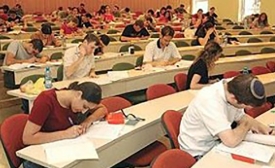citizen diplomacy
Real ambassadors for China over coming decades will be the Chinese people, says scholar. China foreign policy expert Zhao Minghao believes the current world order is in a "plastic" moment. The research fellow at the China Center for Contemporary World Studies, the Communist Party of China think tank, argues many of today's international institutions emerged in the aftermath of World War II and now need to be reshaped.
How the youth hostel represents the essence of public diplomacy.

Nancy Snow on why student exchanges are an important aspect of public diplomacy.
Some of the most important work of citizen diplomacy that's been done in a long time, I suspect, is the trip recently organized by Code Pink that took nearly 40 U.S. peace activists to Pakistan. They met with elected officials, tribal leaders, drone victims whose existence the U.S. government denies, and with the U.S. Ambassador.
Minister of Public Diplomacy Yuli Edelstein told students and young professionals not to blame reporters for Israel’s poor image at a conference on media and hasbarah at Ariel University earlier this month...Edelstein also urged citizens to take an active role in Israel’s public diplomacy efforts, stating that, “Citizens, who photograph and share it on social media introduce to the world our human face.”
Diplomacy, until recently, was reserved for diplomats. As official ambassadors of governments, it has traditionally been the near-exclusive realm of diplomats to impose visa bans and financial sanctions, advise executives on how to defend national interests and ideals, persuade foreign governments to change behaviors, argue for international energy or trade deals, and negotiate treaties. Today, these activities are increasingly being undertaken by citizen diplomats who force the hands of governments on foreign policy issues, rather than follow their leads.
When it comes to diplomatic achievements, often common citizens can be even more effective than foreign relations specialists. In all likelihood this is because, at the grassroots level, interaction on the basis of pure friendship is possible; whereas in relations between professional politicians, words and actions tend to be determined by national interests.
The J-Center brings together leaders from Japan and the United States dedicated to developing the best Japan-focused programs in the American Midwest...The J-Conference will help shape the future of relations between organizations, institutions, individuals, and corporate citizens in the American Midwest and Japan.







